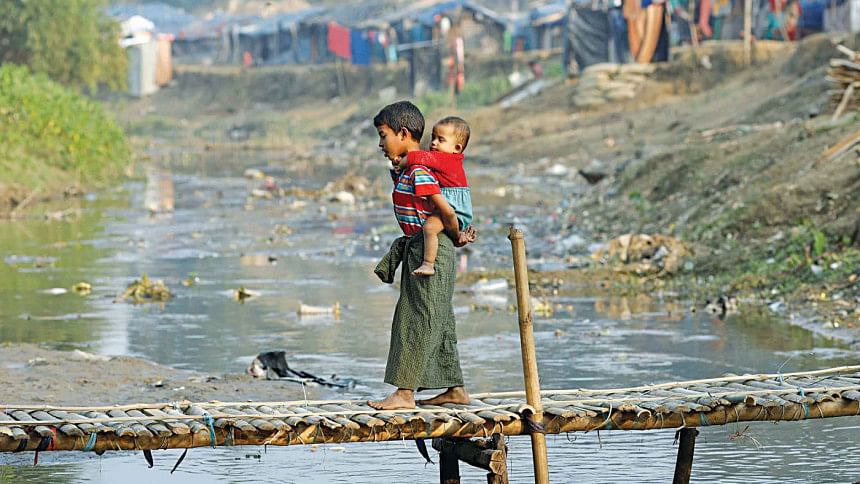Empathising with refugees

I was recently conversing with a friend living in Cox's Bazar who was boiling with anger against the Rohingya refugees on their prolonged stay in the camps in Bangladesh. Perhaps, many Bangladeshis like my dear friend share the same angst about how long we will have to carry the "burden" of one million refugees. The nation that pleaded with the government to open their borders for hundreds of thousands of Rohingya waiting on the other side has slowly shifted from a kind-hearted host to a sceptical one. I could argue with him about the human "right to have rights", right to self-determination, or Kant's "right of temporary sojourn". However, such a perspective takes a while to inculcate and would be extremely difficult to argue in a brief conversation. I kept thinking about what could be a practical way to empathise with refugees or to see refugees as someone like him or me.
A common understanding across every nation-state is that our civic duty extends only to citizens of the same nation. Some immigration scholars (functionalists) argue that nations' moral obligation first ought to be inclined to "our people" or "our own poor." These ideas of a nation's moral obligation are premised on two assumptions—one, our state does not cause the harm that led to refugee movements and two, only those states who induce the refugee problem are responsible for refugees.
One way to rise above these assumptions is if we could view a nation-state as a refugee-generating scheme. Every state or nation-making process is built on the binary of constructing citizen vs non-citizen/citizen vs refugee. If this idea of the nation-state is too abstract to you, think once of how many refugees and asylum seekers have stemmed from your country, while at the same time, you think your nation is not related to the plights of refugees. How many Bangladeshis know that in the year 2019, 17,587 people "fled" Bangladesh and applied for asylum in EU countries? Between 2014 and 2019, 160,737 Bangladeshis sought political asylum in countries including the US, Canada, the UK, Italy, Japan and South Africa.
News of the deportation of "illegal" Bangladeshi migrants from different countries and transit routes, including the US, Singapore and Libya, are not unheard of. In 2016, NBC News followed up the story of Jahed Ahmed, who fled from political repression to seek asylum in the US by traveling all the way through South America. This route to the US through South or Central America has been a common one throughout 2018 and 2019. So much so that Bangladesh has been in the list of top five nationalities, among other African and Asian countries, who take this route. Recently, the migrant caravans that traveled from Central America to the US-Mexico border included Bangladeshis who requested asylum in the US. In 2012, Bangladesh was one of the four countries from where Brazil got most of its asylum seekers and refugees—1,608 Bangladeshis requested refuge there between 2017 and 2019. These are only partial statistics. My argument here is that if a nation thinks adversely of taking on some other nation's "burden", perhaps we should also try to comprehend how every nation can create a "burden" for other nations.
As of 2020, around 82.4 million people are either refugees or displaced from their homes, the UNHCR said on Friday. In the near future, the number of refugees and displaced people will continue to increase because of the impacts of climate change. Not to mention, Bangladesh is one of the countries threatened by the imminent sea-level rise and more likely to produce millions of climate refugees. Currently, environmental issues like river erosion that is causing internal displacement will be escalated by sea-level rise by 2050, which could potentially displace 25 to 30 million people in Bangladesh, who are likely to be pushed towards transboundary migration.
This is not the time when we can shy away from the refugee crisis—instead, it is high time when every nation should collectively push for more liberal rights for refugees. Humanitarian laws are filled with built-in loopholes that obstruct providing justice to refugees. The 1951 UN Refugee Convention does not even recognise climate refugees—only recently did the UN, for the first time, recognise a man from the Republic of Kiribati who applied for asylum on the basis of climate change. To even attain legal protection as refugees, one must have a nationality, and there is a lack of responsibility towards stateless people under international law.
Thus, before we harbour a negative attitude towards refugees, we could empathise with the concession a refugee is paying for a bare minimum living. When we rage against refugees for being "free riders", we could think of the fact that, every day, they are faced with a choice between food, livelihood, shelter and freedom of movement—which should not be choices in the first place. We could broaden our views by seeing them more as victims of a "situation." Refugees deserve dignity and respect, since they are the survivors of dreadful persecution.
Morsaline Mojid is Assistant Professor at Ahsanullah University of Science and Technology (AUST).

 For all latest news, follow The Daily Star's Google News channel.
For all latest news, follow The Daily Star's Google News channel. 



Comments